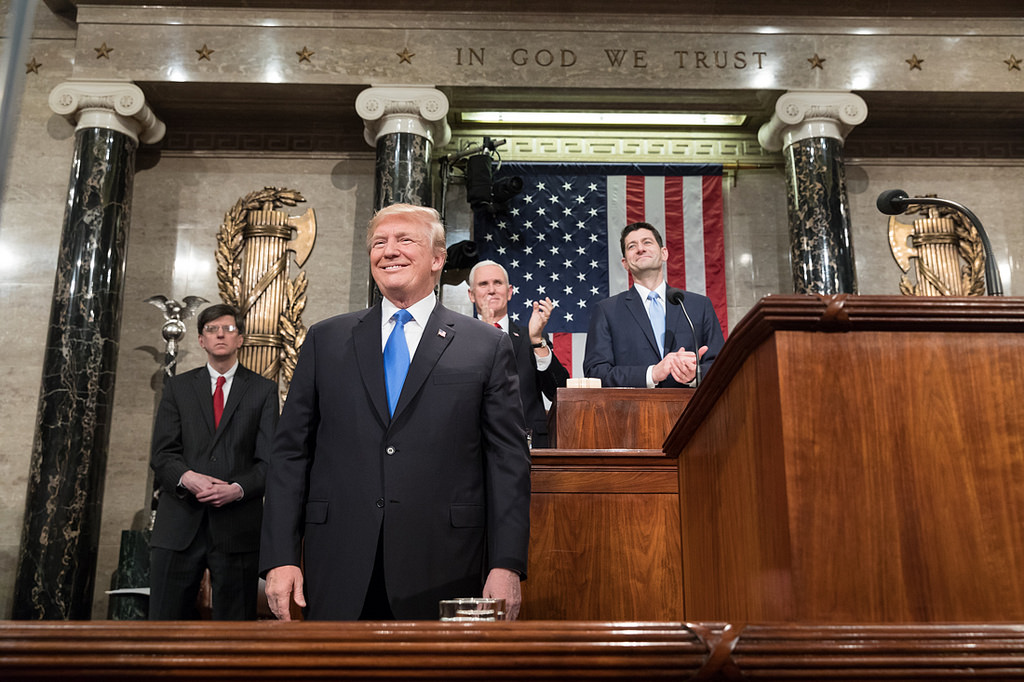How President Trump’s Comments on ‘Flipping’ Witnesses Undermine Law Enforcement
What does it mean for a criminal defendant to “flip”?
Last week, President Donald Trump slammed the practice of calling cooperating defendants to testify against others in exchange for a reduced sentence, often called “flipping.” This practice is commonplace in our criminal justice system, and prosecutors rely on it to access valuable testimony and ultimately convict defendants at the highest levels of criminal organizations.

Published by The Lawfare Institute
in Cooperation With

What does it mean for a criminal defendant to “flip”?
Last week, President Donald Trump slammed the practice of calling cooperating defendants to testify against others in exchange for a reduced sentence, often called “flipping.” This practice is commonplace in our criminal justice system, and prosecutors rely on it to access valuable testimony and ultimately convict defendants at the highest levels of criminal organizations.
It’s a practice President Trump is familiar with: “It's called flipping and it almost ought to be illegal,” Trump said in a television interview with Fox News following the guilty plea of his attorney Michael Cohen. “I know all about flipping—30, 40 years I have been watching flippers,” the president continued. “Everything is wonderful and then they get 10 years in jail and they flip on whoever the next highest one is or as high as you can go.”
In other words, the president values personal loyalty over telling the truth.
You might expect this sentiment from a mob boss or a drug kingpin, but not the President of the United States—especially one who claims to support law enforcement. His comments undermine law enforcement officers’ ability to do their jobs.
Trump’s misleading and self-serving criticism of the use of cooperators is harmful on two levels. First, his comments ignore the many safeguards that test the credibility of cooperators. And second, the president’s words are likely to erode the effectiveness of cooperators in cases across the country, making it harder to convict criminals.
Safeguards in Cooperation Agreements
Prosecutors are rightly skeptical of any cooperator’s credibility. Cooperation usually begins with discussions between prosecutors and defense counsel, initiated by either party, in which the defense attorney provides an “attorney proffer”—a statement of what the defendant knows. Evidentiary rules protect such proffers from being used against the client if a plea deal does not materialize. If the prosecution thinks that the information might aid the prosecution of others whose conduct is more egregious than the cooperator’s crimes, the parties will then try to negotiate an immunity agreement, under which the cooperator will speak candidly and the government will not use his statements against him. The only way the cooperator can harm himself is by lying, violating the deal and allowing his statements to be used against him. This arrangement provides a powerful incentive for the defendant to be truthful.
After reaching an immunity agreement, federal agents question the cooperator about an array of topics, testing the veracity of his statements against other evidence that they have collected, including witness statements and documents. They might confront him with business records, emails, text messages and recorded conversations. Only if the prosecutors are satisfied that he is telling the truth will they call him as a witness at trial. Otherwise, they will scrap him as a witness, and allow him to plead guilty or go to trial.
Next, the defendant must plead guilty to his own criminal conduct and enter a plea agreement. A cooperator does not walk free—he must admit and own all of his crimes. A written plea agreement will usually state that if the defendant provides “substantial assistance” in the investigation and prosecution of others, the government will bring the defendant’s cooperation to the attention of the judge and move for a reduced sentence. In a national security case, a cooperator can also earn credit by providing valuable intelligence information, such as sources and methods of a foreign adversary or the extent of damage from a leak of classified information. The judge, not the prosecutor, ultimately decides whether to reduce the sentence and by how much.
When a cooperator testifies at trial, the jurors are instructed that they should regard his testimony with more skepticism than that of other witnesses because he is receiving the benefit of a recommendation for a reduced sentence. As a result, prosecutors will use a cooperator as a witness only if they can support his testimony with documents and testimony from other witnesses that tell a consistent story. This corroboration gives jurors and judges the comfort that cooperators testify truthfully. But even with corroborating evidence, a cooperator can add value to the prosecution by offering context and serving as a narrator to connect the dots contained in exhibits. They can help tie together disparate bits of evidence to help jurors see the big picture.
For example, in the Paul Manafort trial in Virginia, Manafort’s former associate Richard Gates, who had entered a plea agreement with prosecutors, testified about his own role in assisting Manafort’s tax violations and bank fraud. Because of his own misconduct on cross-examination, Gates made for a particularly unlikeable witness. Still, he provided an important part of the prosecutors’ case: While the documents and other witnesses may have been enough to convict Manafort, Gates was able to link evidence together in an understandable way. For instance, he was the only witness who explained how and why a number of false invoices were created and then used to extract funds from Manafort’s undeclared offshore bank accounts.
It is not uncommon to hear jurors say, as one did in Manafort’s case, that they disregarded the testimony of a cooperator and relied on other evidence. That may be true in part, but no doubt, Gates’s testimony helped the jury to understand the evidence. The point is that while a cooperator may help the jury digest the case, his testimony alone does not bring down the defendant who is on trial. All of these safeguards help assure that a cooperator’s testimony leads to a just result.
The practice of using cooperators against higher ups has its critics. Any witness who receives a reward for his testimony is appropriately viewed with some skepticism. Some critics also say cooperation agreements have class effects: For indigent defendants—whose attorneys are usually talented but overworked and underfunded—cooperation agreements are perceived by some as a necessary evil because the defendant lacks the resources to undertake the expenses of going to trial. But in a well-funded white-collar case, those issues are less of a concern.
Some defendants try to cooperate but flame out because they lie or make public statements that are contrary to the facts. For example, former Trump campaign adviser George Papadopoulos appears to have gone down the path of cooperation, but did not end up receiving a promise in his plea agreement for a motion to reduce his sentence for substantial assistance. The special counsel made good on its promise to apprise the judge of Papadopoulos’s behavior, which included minimizing his own role, lying about the timing of his meeting with a British professor, and failing to volunteer to the FBI that the professor was in the United States, where he could be questioned or arrested. The filing of the government’s sentencing memo signals that he will not be allowed to cooperate because he proved to be an untruthful witness in preliminary interviews with the FBI. (The only criminal charges against Papadopoulos stemmed from those false statements.)
By contrast, former national security adviser Michael Flynn appears to be on track as a cooperator. His plea agreement includes a cooperation provision, and his sentencing has been delayed—presumably so that he can continue to share information as the investigation unfolds and to testify, if necessary. He may be an example of a defendant who was successfully flipped.
The President’s Comments May Have Widespread Effects
The second harm from Trump’s comment is the effect it could have on cases of all sorts all across the country. Every day, defendants “flip” and agree to testify about the conduct of more serious offenders in prosecutions of drug trafficking organizations, violent gangs, and corrupt public officials. Mob prosecutions, for instance, often rely on flipping a cooperator to obtain evidence against higher members of a criminal organization because those at the highest levels don’t get their hands dirty by committing street-level crimes.
Defense lawyers will likely take advantage of the president’s theme and argue to jurors that flipping should be illegal. If so, it will become increasingly difficult to convict the leaders of criminal organizations, whose associates are the only ones who ever get close enough to convincingly describe their criminal activity.
When ordinary citizens hear their president criticize the practice and say that it should be illegal, jurors may become hostile to the concept of cooperation. If so, then jurors will be far less likely to find cooperators credible, even when their testimony is corroborated by other evidence. Paula Duncan, the sole juror from the Manafort case to speak to reporters, indicated that the mistrial on 10 of the 18 counts in that case were the result of one hold-out juror. While it is impossible to know exactly what caused her to find reasonable doubt, one wonders whether President Trump has damaged the credibility of the special counsel and the FBI by his constant drumbeat of criticism. After his latest tirade against flipping, what can we expect from jurors when defendants cooperate against their criminal associates in courtrooms across the country? Will they come to view prosecutors as just more cogs in the partisan wheel? Or will the president go even further, and implement an executive-branch legal policy that forbids the practice of flipping defendants altogether?
***
The bully pulpit of the presidency provides a powerful microphone. A sitting president needs to use it responsibly and not for self-serving means. President Trump‘s disparaging comments will have negative long-term consequences on the ability of law enforcement to convict criminals and protect public safety.



.png?sfvrsn=48e6afb0_5)

